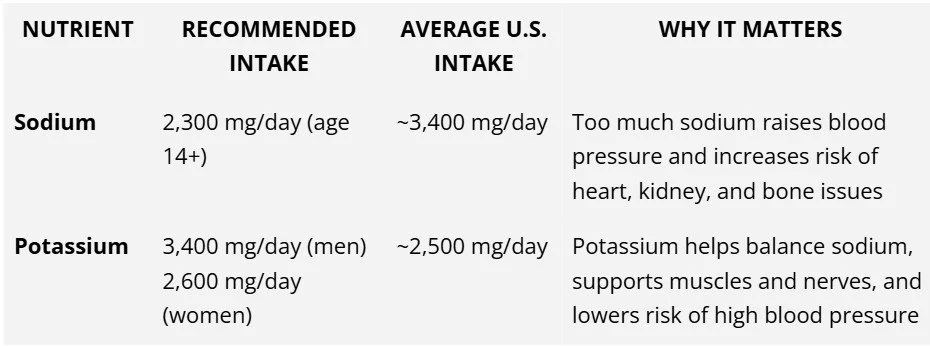Do You Really Need Electrolyte Supplements? What to Know Before You Buy
What Are Electrolytes and Why Do They Matter?
Electrolyte supplements are the talk of the town in the health and wellness space lately. Advertisements will have us believing that our energy levels, training performance, and even mental cognition hinge upon a packet or two a day of these salty, fruity water enhancers. Is there truth to these claims? Or are we being sold overinflated promises?
Before we unpack who these supplements might be most beneficial for, let’s briefly discuss the individual electrolytes in the human body and their primary roles:
Sodium: The primary electrolyte found in extracellular (outside of the cell) fluid. Its job is to regulate fluid balance (via water retention) and blood pressure, and also works symbiotically with potassium in the nerve conduction process.
Potassium: The primary electrolyte found in intracellular (inside of the cell) fluid. Its job is to regulate fluid balance (via water excretion), support proper muscle function, and also works symbiotically with sodium in the nerve conduction process.
Chloride: A companion to sodium that helps regulate fluid balance.
Magnesium: A powerhouse electrolyte that plays hundreds of roles in the body. Among them are supporting muscle and nerve function, protein synthesis, energy production, DNA repair, blood glucose regulation, and bone density.
Calcium: Another necessary player in muscle and nerve function, but also ensures strong bones and teeth.
Phosphate: Works alongside calcium and magnesium in supporting bone health and also has a hand in energy production.
Bicarbonate: A buffer necessary for maintaining the body’s acid-base balance (pH).
While most of these are not going to be relevant to the conversation around commonly promoted supplements in the health and wellness space currently (LMNT, Liquid IV, etc.), it’s good to know what they all do, individually and together!
Sodium and Potassium: Daily Needs vs. Current Reality
Recommendations for Sodium Intake
While recommendations vary by age and pre-existing health conditions (including, but not limited to: high blood pressure, heart disease, kidney disease, diabetes, and Postural Orthostatic Tachycardia Syndrome or POTS), presently, the USDA recommends people over 14 years of age keep sodium intake to 2,300mg/day.
Recommendations for Potassium Intake
While recommendations for potassium also vary some by age and pre-existing health conditions (e.g. inflammatory bowel disease), as well as usage of certain medication, the current daily adequate intake (AI) for those born male is 3,400mg and those born female is 2,600mg. Food labels list 4,700mg as the daily recommendation, denoting that in most cases, more potassium is ideal.
How the Standard American Diet Influences Intake of Sodium and Potassium
The USDA recommends keeping sodium to 2,300 mg/day, while the average American consumes about 3,400 mg - with a majority of that sodium coming from packaged foods. That means our average sodium intake is already roughly 33 percent higher than USDA recommendations!
Potassium intake is estimated to be considerably lower than the named adequate intake, let alone the recommended intake, at just 2,500mg/day, due to the high consumption of ultraprocessed foods (UPF). According to the American Hearth Association, this average ratio is strongly associated with increased risks of high blood pressure, heart disease, kidney disease, osteoporosis, and stomach cancer.
Given all of this information, let’s now consider who might benefit from a widely marketed* powdered electrolyte supplement, and who supplementation might not be especially relevant–or may even be harmful in the long run–for.
*These formulations typically contain a significant amount of sodium (500-100mg) and very little potassium (200-370mg), depending on the brand.
Who Actually Benefits from Electrolyte Powders?
You may benefit if you…
Live in a hot and/or humid climate and tend to sweat significantly due to weather conditions (an increase in sweat/body water loss means loss of electrolytes)
Are an athlete that trains for long periods of time and experiences higher rates of perspiration due to their activity participation
Eat a primarily whole foods diet with little additional salt intake
Have a known health condition that could necessitate a higher sodium intake (POTS, etc.)
You may want to reconsider if you…
Live in a cooler and/or drier climate and don’t sweat much due to weather conditions
Are not especially active or do not participate in intense activity for long enough bouts of time to experience higher rates of perspiration
Eat ultraprocessed, packaged, or restaurant food daily, or add salt your meals
Have a known health condition or a family history of a health condition that increasing sodium intake could be detrimental to
TLDR; Most people don’t need daily electrolyte supplements. Unless you’re an athlete, live in hot climates, or sweat heavily, your food usually provides enough.
A Quick Note on Magnesium Supplementation
While this blog post is focused on the tasty, flavored electrolyte powders that are on the market today and have us seeing a need to address their potential overuse in populations who don’t need them, magnesium supplementation should be touched on since we get asked about it frequently by our clients at KLN as well. There are a number of different types of magnesium that can be supplemented to help support specific functions or address specific symptoms/concerns, and since it is an electrolyte involved in so many bodily processes and that many individuals, for various reasons, have trouble meeting adequate intake needs through diet alone, it could very well be worth looking into! As always, consult with your health care provider about whether or not magnesium supplementation might be right for you and what type of magnesium, dosage, etc. you should consider based on your needs or desired effects.
How to Choose the Right Electrolyte Supplement
Look for an electrolyte supplement that has a sodium content per serving that seems appropriate for your needs. Consider your: activity type, duration, and intensity; water intake; water loss due to sweat; dietary sodium and potassium intake; overall health status.
Shop around for one that has a lower sodium to potassium ratio. Some lesser known brands may be more ideal for this than more popular ones.
Don’t automatically opt for a sugar free option. Carbohydrates help transport electrolytes and act as a teammate in the hydration process. Consider your carbohydrate intake around the time you plan to consume the supplement. If you won’t be including additional carbohydrates before/during/after that period of time otherwise, your cells will benefit from one that carries some sugar!
The Bottom Line on Electrolytes
While everyone needs electrolytes to live and thrive, not everyone needs to supplement with them, and, in fact, most of us would benefit from looking at where and how we can more appropriately meet our individual needs through the foods that we eat. Despite what companies may lead us to believe for the sake of acquiring paying customers, supplements are just that: supplemental to an intentional, nutrient rich diet.
You don’t have to guess about hydration, supplements, or how to fuel your workouts. Our team will walk with you step by step. For high support coaching and guidance, apply for our 1:1 Nutrition Coaching.


